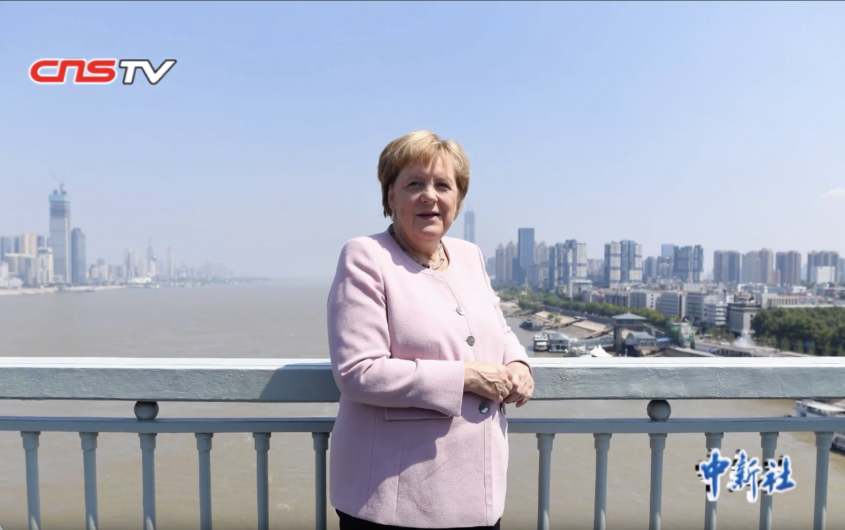
Merkel’s Subdued Visit to China A Success?

Yixiang Xu
China Fellow; Program Officer, Geoeconomics
Yixiang Xu is the China Fellow and Program Officer, Geoeconomics at AGI, leading the Institute’s work on U.S. and German relations with China. He has written extensively on Sino-EU and Sino-German relations, transatlantic cooperation on China policy, Sino-U.S. great power competition, China's Belt-and-Road Initiative and its implications for Germany and the U.S., Chinese engagement in Central and Eastern Europe, foreign investment screening, EU and U.S. strategies for global infrastructure investment, 5G supply chain and infrastructure security, and the future of Artificial Intelligence. His written contributions have been published by institutes including The Chinese Academy of Social Sciences, The United States Institute of Peace, and The Asia Society's Center for U.S.-China Relations. He has spoken on China's role in transatlantic relations at various seminars and international conferences in China, Germany, and the U.S.
Mr. Xu received his MA in International Political Economy from The Josef Korbel School of International Studies at The University of Denver and his BA in Linguistics and Classics from The University of Pittsburgh. He is an alumnus of the Bucerius Summer School on Global Governance, the Global Bridges European-American Young Leaders Conference, and the Brussels Forum's Young Professionals Summit. Mr. Xu also studied in China, Germany, Israel, Italy, and the UK and speaks Mandarin Chinese, German, and Russian.
__
According to China’s Ministry of Foreign Affairs, Angela Merkel’s visit to China last week was a resounding success. The ministry’s spokesperson lauded the bilateral commitment on multilateralism and free trade, expanding market access, and cooperation on technology. But at home in Germany, the chancellor’s twelfth trip to China was far less impressive. Amid persisting Sino-U.S. trade tension and continuing unrest in Hong Kong, Merkel was simultaneously pressed to extract promises from Beijing to keep opening up its economy and to stand up for democracy in Hong Kong. Critics feared that a weakening economy in Germany would force Merkel to go soft on Beijing and undermine a united European position on China.
And that was what happened. Merkel did insist that Beijing find a peaceful solution in Hong Kong, but she was promptly countered by Chinese premier Li Keqiang that China is competent at dealing with its domestic issues. Merkel reiterated Germany’s commitment to deepen bilateral cooperation and to advance negotiation for the EU-China Investment Agreement during its EU presidency next year, but she walked away with only a token promise from Beijing to further open the Chinese market and scarce mention of reforms.
Germany is stuck between a rock and a hard place. On the one hand, its slowing export-oriented economy looks to the Chinese market for growth. China might be a systemic competitor, but German companies continue to invest in China and German technology startups openly court Chinese capital. On the other hand, a collective German brand as defender for democracy fuels public demands, including members of Merkel’s CDU party, to stand up to Beijing over protests in Hong Kong. Merkel was compelled to walk a very fine line to advocate her causes without antagonizing Beijing, with little leverage. She succeeded in doing that. But these tactics won’t be successful without a well thought-out strategy that is based on an honest assessment of China’s long-term political and economic needs.
The German government joined a chorus of other Western democracies in demanding that Beijing respect the democratic rights of Hong Kong citizens after months of intense protests and riots over Hong Kong Chief Executive Carrie Lam’s refusal to withdraw a proposed extradition bill with China. After Merkel’s China trip, German foreign minister Heiko Mass met with Hong Kong pro-democracy activist Joshua Wong in Berlin, drawing condemnation from the Chinese government.
While it is safe to assume that different aspects of the bilateral relationship will continue to be managed separately, Berlin must understand by now that Beijing will always prioritize sovereignty over economy. Now that Carrie Lam has formally withdrawn the bill, Joshua Wong’s additional demand for more autonomy and completely free elections in the city poses a serious challenge to Beijing’s authority. Upon his arrival in Germany, Wong compared Hong Kong to Berlin during the Cold War. But Hong Kong is a part of China and the city’s basic law only guarantees the One-Country-Two-Systems arrangement for fifty years. Hong Kong is an important financial hub for German companies and any erosion in its political and economic freedom should have Berlin concerned. But instead of solidifying Beijing’s view of the city’s special status as a political nuisance, Germany should work to persuade the Chinese government that the current arrangement works well for China and warrants a renewal beyond 2047. Even if Beijing doesn’t end Hong Kong’s semiautonomous status prematurely, it has already started to accelerate development of Shenzhen on the mainland as a replacement for Hong Kong. In the end, the losers could be Hong Kong’s citizens and its foreign investors.
Berlin also needs to reflect on its approach to address market reciprocity and intellectual property rights issues with China. The Chinese economy is under serious pressure from the Sino-U.S. trade war and aggressive U.S. efforts to decouple from Chinese tech companies. China wants to expand its market access and find alternative tech partners in Europe. But that does not mean that Beijing is ready to accommodate Germany’s demands. The ongoing trade war and unravelling global tech supply chain have only strengthened the Chinese government’s resolve to become self-sufficient in leading technologies. Through R&D at home or acquisition abroad, Beijing is determined to own these technologies and create more home-grown champions like Alibaba and Huawei that could compete on the global stage. Members of Merkel’s large German business delegation love to hate their companies’ dependency on the Chinese market. But alone they cannot extract much meaningful commitment from Beijing. Instead, Berlin should work toward reforming EU competition rules to allow the formation of Europe’s native champions and increase its domestic spending on R&D in key sectors. When Germany assumes the EU presidency in 2020, it needs to push for a unified EU response to China and demand the EU be treated by Beijing as a single bloc when it hosts the proposed China summit.








